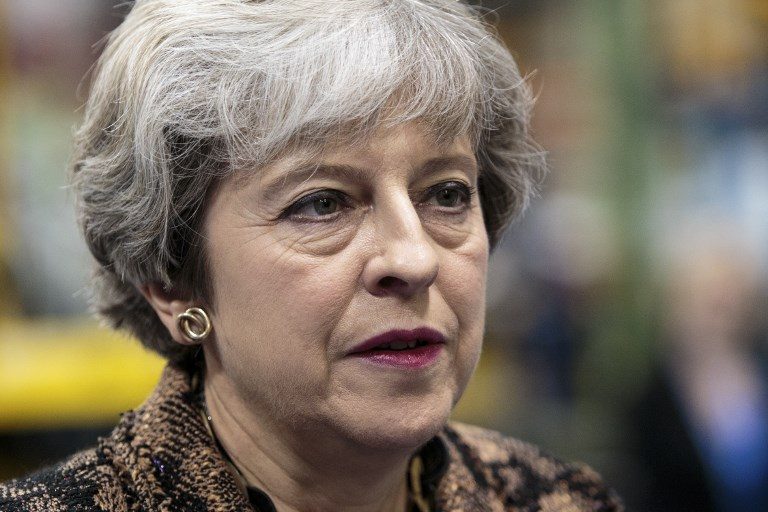SUMMARY
This is AI generated summarization, which may have errors. For context, always refer to the full article.

LONDON, United Kingdom (3rd UPDATE) – Prime Minister Theresa May will set out Monday, January 21, how she hopes to salvage her Brexit deal following its rejection by MPs, after cross-party talks failed to break the political deadlock just 10 weeks before departure day.
Britain will leave the European Union on March 29 without any new arrangements in place unless MPs can agree to an alternative or modified plan that the bloc can also accept.
London and Brussels have spent the best part of two years working on May’s agreement, but MPs in parliament’s lower House of Commons comprehensively rejected it last week.
May responded by opening talks with rival political parties, but has so far resisted their demands that she take a radically new approach.
Instead the Conservative leader is focused once again on finding a way to overcome opposition on her own side to the controversial Irish “backstop” plan in the current deal.
“It’s clear already that a significant number of colleagues have expressed concerns about the backstop and that’s one of the areas we’re going to be looking at,” her spokesman said ahead of a statement by May to MPs later Monday.
The prime minister has not ruled out reopening the Brexit agreement, but EU leaders have warned she should not expect any fundamental changes.
EU chief negotiator Michel Barnier suggested on Monday the bloc could review a political statement on future relations that was agreed alongside the divorce terms.
“We are open to work again on the political declaration and to be more ambitious for the future relationship,” he told the Irish RTE broadcaster.
EU warnings
Barnier spoke after talks with Irish Foreign Minister Simon Coveney in Brussels, where he and other EU foreign ministers gathered for a regular meeting.
The other 27 European Union nations are watching closely for May’s next move.
Spanish Foreign minister Josep Borrell was pessimistic that May would conjure up something to win over British MPs.
“I don’t think it can be saved by marginal adjustments in the current plan,” he said.
“It therefore has to present something substantially different, but naturally that has to be approved later in the EU.”
Slovakia’s Miroslav Lajcak said: “This is a fair deal that 27 members strongly support so I would really not touch [it].”
May has said that if she finds a way through the gridlock in London, she could return to Brussels for talks with the EU.
“We now know what they don’t want in London. We must now finally know what they want,” said Germany’s Heiko Maas.
‘Hijack Brexit’
But little may be decided until next week, increasing the risk Britain severs ties with its biggest trading partner on March 29 without any new terms in place.
With her statement on Monday, May will table a motion to parliament, but it will not be debated until January 29.
Then, there could be fireworks – MPs are planning to table amendments which would try to force May to stop Britain leaving the EU without a deal, or delay the process.
May has said that the only way to avoid “no deal” is to agree a deal, and insists Brexit will happen on March 29.
Her spokesman on Monday condemned the parliamentary maneuvers, saying they are “evidence of the danger that parliament could stop Brexit.”
International Trade Secretary Liam Fox, a leading Brexit supporter in May’s government, warned that “parliament has not got the right to hijack the Brexit process.”
Irish backstop
One of the most problematic areas of the divorce deal is the backstop, a legal guarantee that the frontier with Ireland would remain free-flowing if Britain and the EU cannot agree a long-term free trade pact.
This could see Britain tied to EU trade rules for years to come as well as a separate status for Northern Ireland, and is strongly opposed by many Conservative MPs and Northern Ireland’s Democratic Unionist Party (DUP), on whom May counts for a majority in parliament.
“If we’re going to get parliament to support the deal … we’re going to have to bring forward something which is different,” May’s spokesman said Monday.
He denied reports the government was considering re-opening the 1998 Irish peace accords, or negotiating a bilateral deal with Ireland to avoid the need for the backstop. – Rappler.com
Add a comment
How does this make you feel?
There are no comments yet. Add your comment to start the conversation.